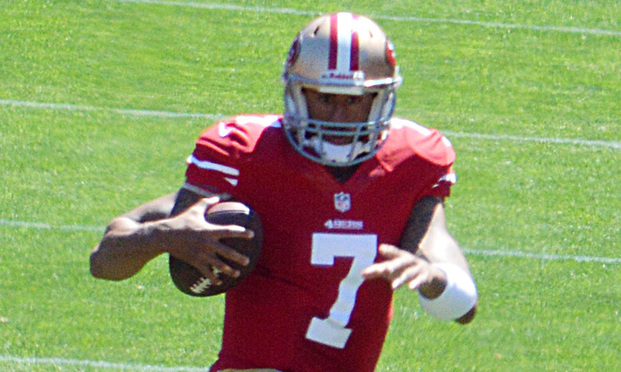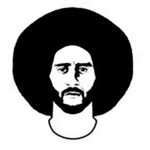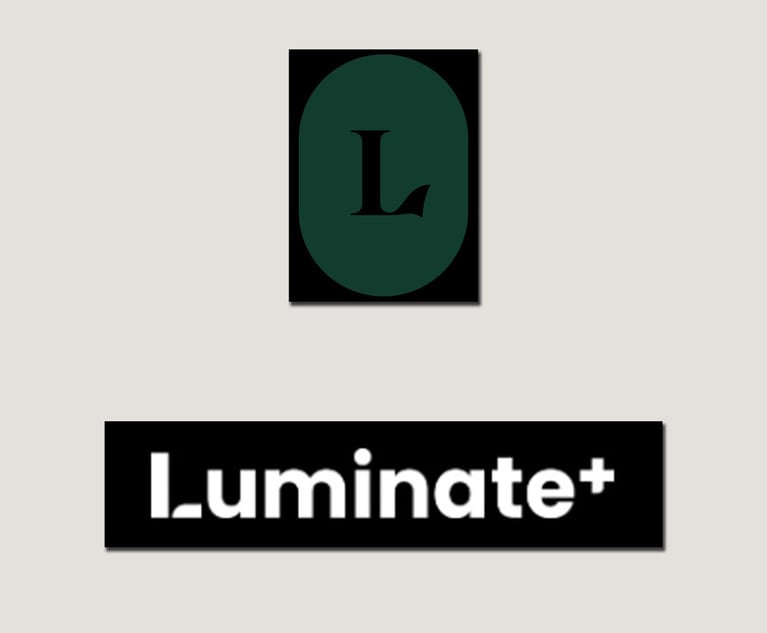Kaepernick's Trademark Application for Face, Hair Is 'Ambitious,' IP Lawyer Says
The application filed by Bruce H. Bernstein, a co-managing partner at Greenblum & Bernstein, includes nearly a score of classes of products and services.
October 12, 2018 at 03:39 PM
4 minute read
 Colin Kaepernick/photo by Daniel W. Hartwig/Wikimedia Commons
Colin Kaepernick/photo by Daniel W. Hartwig/Wikimedia Commons
Colin Kaepernick, the former quarterback for the San Francisco 49ers and the face of Nike's current advertising campaign, applied to the U.S. Patent and Trademark Office last week seeking trademark rights to a black-and-white image of his face and hair.
The application, which was first reported by ESPN, includes 17 classes of products and services that range from lotion and jewelry to self-empowerment classes.
Kaepernick is represented by Bruce H. Bernstein, a co-managing partner at Greenblum & Bernstein in Reston, Virginia. Bernstein declined to comment Friday. Kaepernick's business manager's assistant also declined to comment.
“It's a pretty ambitious application,” said Michael P. Cohen, the founder and principal of Cohen IP Law Group. “You typically don't see 17 classes.”
Cohen explained that once Kaepernick is granted preliminary approval, he will have to go back to the USPTO showing that he is using each of the products in commerce before the trademark is granted final approval.
Eric Perrott, a trademark and copyright attorney at Gerben Law Firm in Washington, D.C., said the trademark filing shows that Kaepernick is taking action on his movement. Part of the application indicates that he intends to use the image to promote a variety of classes, including one that teaches people how to interact with law enforcement.
While other athletes have certainly trademarked their images before, none, as far as Cohen could find, has applied to have a trademark of their image linked to their political beliefs.
Aside from its civic motives, the trademark would allow Kaepernick to license his image.
“He might not produce a brand of lotions, but he might have a partnership where he licenses the image to him,” Perrott explained. “He would still maintain protection over it.”
 The image of Colin Kaepernick that he and his company, Inked Flash, have filed for trademark protection/Credit: USPTO
The image of Colin Kaepernick that he and his company, Inked Flash, have filed for trademark protection/Credit: USPTOThat protection goes a long way. Tennis player Roger Federer ended up losing the “RF” logo with which he was associated when he left Nike to join the Japanese brand Uniqlo, because Nike owned the RF logo.
If the application is approved and Kaepernick licenses the image to Nike, he would retain the image if he chose to go to a different company.
“If they [athletes] can own all of those things, it is a huge win because they can use it in the future,” Perrott said.
Perrott also said the trademark would provide protection for Kaepernick's black-and-white image if someone wants to use it to put on a shirt mocking him and his political beliefs.
“If an opponent to his movement wanted to use the image of his face on a consumer product as a joke, he would be in a position to get them to stop,” Perrott explained.
Cohen said that in another scenario, where someone uses only part of the image on a product, Kaepernick would have legal recourse depending on the facts of the case because of the trademark.
This all is if the trademark gets approved. The application was filed on Oct. 5 and Cohen said that it can take the USPTO four to six months before a preliminary approval is granted.
This content has been archived. It is available through our partners, LexisNexis® and Bloomberg Law.
To view this content, please continue to their sites.
Not a Lexis Subscriber?
Subscribe Now
Not a Bloomberg Law Subscriber?
Subscribe Now
NOT FOR REPRINT
© 2025 ALM Global, LLC, All Rights Reserved. Request academic re-use from www.copyright.com. All other uses, submit a request to [email protected]. For more information visit Asset & Logo Licensing.
You Might Like
View All
Global Software Firm Trying to Jump-Start Growth Hands CLO Post to 3-Time Legal Chief

In-House Legal Network The L Suite Acquires Legal E-Learning Platform Luminate+

Up-and-Comer Scores First Legal Chief Post With Baltimore Orioles, the Team He Cheered for as Kid

Ad Agency Legal Chief Scores $12M Golden Parachute in $13B Sale to Rival
3 minute readTrending Stories
- 15th Circuit Considers Challenge to Louisiana's Ten Commandments Law
- 2Crocs Accused of Padding Revenue With Channel-Stuffing HEYDUDE Shoes
- 3E-discovery Practitioners Are Racing to Adapt to Social Media’s Evolving Landscape
- 4The Law Firm Disrupted: For Office Policies, Big Law Has Its Ear to the Market, Not to Trump
- 5FTC Finalizes Child Online Privacy Rule Updates, But Ferguson Eyes Further Changes
Who Got The Work
J. Brugh Lower of Gibbons has entered an appearance for industrial equipment supplier Devco Corporation in a pending trademark infringement lawsuit. The suit, accusing the defendant of selling knock-off Graco products, was filed Dec. 18 in New Jersey District Court by Rivkin Radler on behalf of Graco Inc. and Graco Minnesota. The case, assigned to U.S. District Judge Zahid N. Quraishi, is 3:24-cv-11294, Graco Inc. et al v. Devco Corporation.
Who Got The Work
Rebecca Maller-Stein and Kent A. Yalowitz of Arnold & Porter Kaye Scholer have entered their appearances for Hanaco Venture Capital and its executives, Lior Prosor and David Frankel, in a pending securities lawsuit. The action, filed on Dec. 24 in New York Southern District Court by Zell, Aron & Co. on behalf of Goldeneye Advisors, accuses the defendants of negligently and fraudulently managing the plaintiff's $1 million investment. The case, assigned to U.S. District Judge Vernon S. Broderick, is 1:24-cv-09918, Goldeneye Advisors, LLC v. Hanaco Venture Capital, Ltd. et al.
Who Got The Work
Attorneys from A&O Shearman has stepped in as defense counsel for Toronto-Dominion Bank and other defendants in a pending securities class action. The suit, filed Dec. 11 in New York Southern District Court by Bleichmar Fonti & Auld, accuses the defendants of concealing the bank's 'pervasive' deficiencies in regards to its compliance with the Bank Secrecy Act and the quality of its anti-money laundering controls. The case, assigned to U.S. District Judge Arun Subramanian, is 1:24-cv-09445, Gonzalez v. The Toronto-Dominion Bank et al.
Who Got The Work
Crown Castle International, a Pennsylvania company providing shared communications infrastructure, has turned to Luke D. Wolf of Gordon Rees Scully Mansukhani to fend off a pending breach-of-contract lawsuit. The court action, filed Nov. 25 in Michigan Eastern District Court by Hooper Hathaway PC on behalf of The Town Residences LLC, accuses Crown Castle of failing to transfer approximately $30,000 in utility payments from T-Mobile in breach of a roof-top lease and assignment agreement. The case, assigned to U.S. District Judge Susan K. Declercq, is 2:24-cv-13131, The Town Residences LLC v. T-Mobile US, Inc. et al.
Who Got The Work
Wilfred P. Coronato and Daniel M. Schwartz of McCarter & English have stepped in as defense counsel to Electrolux Home Products Inc. in a pending product liability lawsuit. The court action, filed Nov. 26 in New York Eastern District Court by Poulos Lopiccolo PC and Nagel Rice LLP on behalf of David Stern, alleges that the defendant's refrigerators’ drawers and shelving repeatedly break and fall apart within months after purchase. The case, assigned to U.S. District Judge Joan M. Azrack, is 2:24-cv-08204, Stern v. Electrolux Home Products, Inc.
Featured Firms
Law Offices of Gary Martin Hays & Associates, P.C.
(470) 294-1674
Law Offices of Mark E. Salomone
(857) 444-6468
Smith & Hassler
(713) 739-1250






